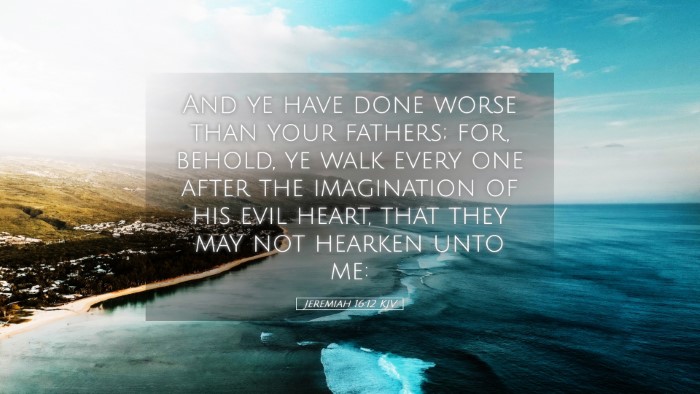Commentary on Jeremiah 16:12
Jeremiah 16:12: "And you have done worse than your fathers; for, behold, you walk every one after the imagination of his evil heart, that they may not hearken unto me."
Introduction
This verse represents a pivotal moment in Jeremiah's prophetic ministry, highlighting the deep-rooted disobedience and spiritual decline of the people of Judah. Through a combination of insights from various public domain commentaries, we will explore the background, theological implications, and practical applications of this verse.
Contextual Background
The Book of Jeremiah serves as the prophetic voice during a tumultuous period in Israel's history, specifically leading up to the Babylonian exile. Jeremiah was called to warn the people of Judah regarding their impending judgment due to their persistent idolatry and refusal to adhere to the covenant of God.
Historical Setting
Jeremiah prophesied during a time when Jerusalem faced imminent threats from Babylon. The people's actions, as noted in this verse, illustrate a collective rebellion against God, marked by a departure from the faith of their ancestors.
Theological Insights
This verse encapsulates significant theological themes prevalent in the prophetic literature.
Human Depravity
As noted by Matthew Henry, the phrase "you have done worse than your fathers" indicates a progression of sin. The people are not only repeating the mistakes of their ancestors but are exceeding them in the severity of their rebellion. This speaks to the innate depravity of man and the tendency to sinful inclinations.
Imagination of the Heart
Albert Barnes expounds on "the imagination of his evil heart," highlighting how the human heart is inclined towards evil and its own desires rather than towards God. This reflects the importance of understanding the heart's role in moral and spiritual failure, aligning it with theological concepts of total depravity.
Divine Displeasure
God's consistent call for repentance contrasts sharply with the people's refusal to hearken unto Him. As Adam Clarke notes, this refusal is not just an act of disobedience; it is an active choice to ignore divine warnings. This directly corresponds to God's displeasure, which leads to inevitable consequences for the people.
Practical Applications for Today
The message of Jeremiah 16:12 remains relevant for contemporary believers. Here are a few applications drawn from the commentary insights:
- The Danger of Collective Sin: Modern congregations must remain vigilant against cultural pressures that lead to collective disobedience. The historical pattern observed in Judah warns us against complacency.
- The Role of Imagination: Believers must guard their hearts and thoughts, ensuring that their imagination is aligned with God's truth rather than the corrupt desires of society.
- Responding to Divine Warnings: The refusal to listen can have catastrophic consequences. Pastors and teachers are urged to teach congregants the importance of heeding God’s word and recognizing His call to repentance.
Conclusion
Jeremiah 16:12 serves as a sobering reminder of the consequences of unrepentant hearts. The insights derived from public domain commentaries emphasize the significance of understanding the spiritual condition of one's heart and the need for divine guidance. In a world constantly swayed by evil inclinations, the call to hearken to God remains ever imperative.


